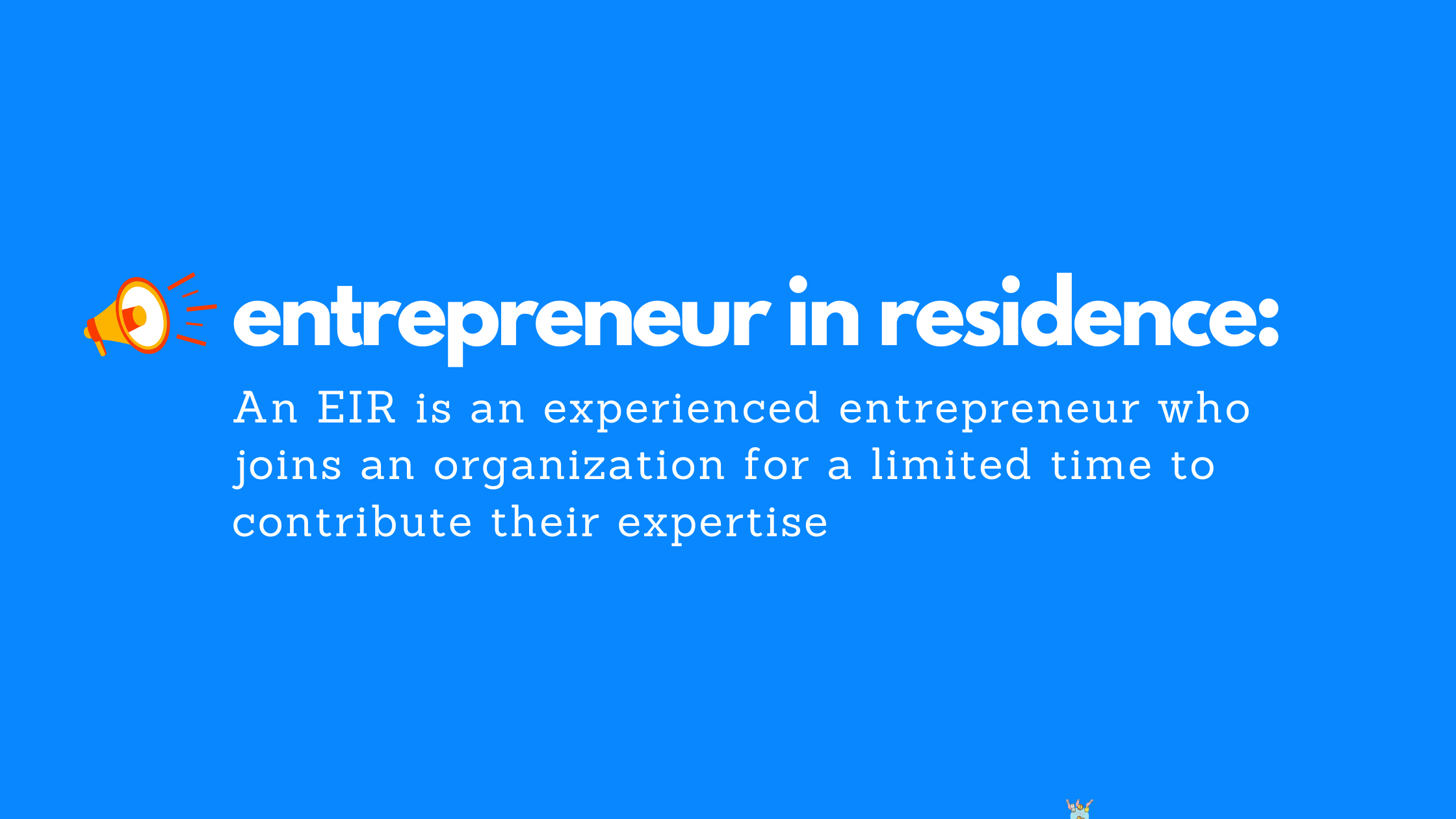Have you ever heard of an Entrepreneur in Residence (EIR) and wondered what that title means? I used to think it meant an entrepreneur who starts a business from his residence. Yeah, I don’t want you to comment on that. Anyway, this term wasn’t any popular before COVID.
An EIR is a seasoned entrepreneur who joins a company temporarily to provide insights, support, and drive new projects. But why is this role gaining traction now? You see, companies are always looking for fresh ideas and innovative approaches to stay ahead of the competition.
Having an EIR onboard offers them a unique blend of experience and an entrepreneurial mindset that can help with growth and creativity. If you’re someone aspiring to become an entrepreneur and help build a plethora of businesses, understanding the role of an EIR could be your next big step.
Let’s talk about what an Entrepreneur in Residence does and how they can make a difference.
What is an Entrepreneur in Residence?
Gone are the days when a company could stay relevant in the market with one old product. Now, you need a portfolio of products and services and need to add on more with time. But you have to understand that every business owner or company can’t build or sell everything. To enter a new market or build a new product, you need an expert to help. This is where EIRs come in.
But what exactly is an Entrepreneur in Residence? No, they aren’t people who start a business from their residence.
Simply put, an EIR is an experienced entrepreneur who joins an organization for a limited time to contribute their expertise. They help develop new business ideas, mentor teams, help with different stages of a startup, or even start a new venture within the company. This role is a perfect mix of strategic thinking, experience, and hands-on expertise.

Origins and History
The concept of an EIR originated in venture capital firms in the 1980s, when these firms saw the value of having seasoned entrepreneurs on hand. They would invite seasoned entrepreneurs on board to scout new investments or assist portfolio companies.
But today, the role has expanded to various industries, including tech companies, universities, and large corporations. By bringing in an EIR, these organizations get access to someone who knows the ropes of building and scaling businesses.
Now, you can find EIRs in many different settings. Universities bring them in to mentor student entrepreneurs and help with startup incubators. Large corporations use them for their entrepreneurial thinking and expertise in their operations. The common thread? An EIR brings a wealth of knowledge and a fresh perspective that can fast-track innovation and success.
The Role of an Entrepreneur in Residence
An Entrepreneur in Residence (EIR) wears many hats and does multiple jobs. But their main job is to bring entrepreneurial expertise to the table. This often means helping to develop new business ideas, providing mentorship, and offering strategic advice.
Let’s break down some of their core responsibilities:
1. Idea Generation
The experience of an EIR in launching businesses gives them a unique perspective on identifying market gaps and opportunities. Here’s how they contribute to idea generation:
- Brainstorming Sessions: EIRs often lead brainstorming sessions with teams to generate creative ideas. They build an environment where out-of-the-box thinking is encouraged.
- Market Analysis: They analyze market trends and consumer needs to identify potential business opportunities. This involves staying updated with industry developments and competitive landscapes.
- Feasibility Studies: EIRs also conduct feasibility studies to evaluate the practicality and potential success of new ideas. They assess factors like market demand, resource availability, and financial viability.
2. Mentorship and Guidance
One of the most valuable roles of an EIR is mentorship. Their guidance helps shape the next generation of entrepreneurs and leaders within the company:
- One-on-One Mentoring: EIRs provide personalized mentorship to new entrepreneurs and team members. They offer advice, share experiences, and help solve problems.
- Workshops and Training: They organize and lead workshops, training sessions, and seminars on various aspects of entrepreneurship, such as business planning, fundraising, and growth strategies.
- Performance Feedback: EIRs give constructive feedback on projects and ideas, helping teams refine their approaches and improve their outcomes.
3. Project Leadership
EIRs are good leaders. They often take the steering wheel of important projects, driving them from concept to execution. Their leadership ensures that projects stay on track and meet their objectives:
- Project Management: EIRs oversee the planning, execution, and completion of key projects. They set goals, allocate resources, and monitor progress to ensure successful outcomes.
- Cross-Functional Collaboration: They work closely with different departments, such as marketing, product development, and sales, to ensure that projects are aligned with overall business objectives.
- Problem-Solving: EIRs help with challenges and obstacles that arise during projects. Their entrepreneurial mindset helps them come up with creative solutions and keep projects moving forward.
4. Networking
Using their extensive networks, EIRs create valuable connections that can benefit the organization in various ways:
- Partnership Development: EIRs establish and nurture partnerships with other businesses, industry leaders, and organizations. These partnerships can lead to collaborative ventures and new business opportunities.
- Investor Relations: They connect the company with potential investors, helping to secure funding for new projects or business expansions.
- Talent Acquisition: EIRs tap into their networks to attract top talent to the organization. They identify and recruit individuals who can contribute to the company’s growth and success.
5. Market Research
EIRs also conduct thorough market research to ensure that the company’s initiatives are aligned with market needs and trends:
- Trend Analysis: EIRs analyze industry trends to forecast future developments. This helps the company stay ahead of the competition and adapt to changing market conditions.
- Customer Insights: They gather and analyze customer feedback and data to understand consumer behavior and preferences. This information is used to tailor products and services to meet customer needs.
- Competitive Analysis: EIRs study competitors to identify their strengths and weaknesses. This information helps the company develop strategies to gain a competitive edge.
In short, EIRs help organizations and firms build a startup from scratch, scale a startup, and train new startup owners. Basically, EIRs help with everything a startup needs!
Impact of an Entrepreneur in Residence on Organizations
Now we know how an EIR helps build businesses and new entrepreneurs. But how do the above-mentioned responsibilities impact an organization? Here’s how:
- Innovation Boost: EIRs help companies and organizations with fresh ideas. Their entrepreneurial mindset helps build a culture of innovation.
- Accelerated Growth: With an EIR’s guidance, companies can grow faster. They help streamline processes and implement best practices from their own successful ventures.
- Enhanced Credibility: An EIR’s presence can enhance a company’s credibility. Their track record attracts investors and partners who trust their expertise.
- Skill Development: Employees benefit from an EIR’s mentorship. They learn new skills and approaches that can be applied long after the EIR’s tenure ends.
I guess now you can see why more companies are favoring this role. The role of an EIR in an organization might be temporary, but they act as a catalyst that fuels permanent change and growth of an org.
Benefits of Having an Entrepreneur in Residence
In the above section, we’ve already talked about the responsibilities of an EIR and the impact they bring within an organization. That pretty much gives a fair idea of the benefits of having an EIR at hand.
But what about the entrepreneurs who help an organization with all this? Do the EIRs benefit from this role? Of course, they do! A business is a two-way transaction, and the same goes with this setting. Organizations benefit a lot from an EIR, but it’s not all vain for the EIRs themselves.
Being an Entrepreneur in Residence comes with several benefits for the entrepreneur:
- Personal Growth: The USP (unique selling point) of an EIR is their knowledge and experience. The more they learn, the more they are valued. So when they join as an EIR, they gain new insights from working with different teams and tackling new challenges.
- Professional Development: This role allows entrepreneurs to refine their skills. They can experiment with new ideas and approaches in a supportive environment. They get the environment, a team, an idea, and everything else to build a startup. A perfect environment for growth!
- Networking Opportunities: For every new startup or product they build, EIRs expand their professional networks. They meet industry leaders, potential partners, and investors, which can be beneficial for current and future ventures.
- Mentorship Roles: Being an EIR offers a chance to give back. They can mentor budding entrepreneurs, sharing their knowledge, helping them succeed, and learning from them as well.
Entrepreneur in Residence Salary and Compensation
In India, the salary for an EIR can vary significantly based on experience, industry, and the specific company. According to Glassdoor, here’s a detailed breakdown of what you can expect:
- Base Pay Range: The base pay for an EIR ranges from ₹10 lakhs to ₹24 lakhs per year.
- Average Base Pay: On average, EIRs earn around ₹17 lakhs annually.
- Additional Cash Compensation: Besides the base salary, EIRs often receive additional cash compensation. This can range from ₹1.25 lakhs to ₹4.5 lakhs, with an average of ₹2 lakhs per year.
But you might think— ”This is shallow.” I thought so too. But the salary isn’t the main reward of an EIR’s expertise. The real compensation comes with additional benefits
Additional Benefits
Apart from the base salary and additional cash compensation, EIRs often enjoy various other benefits. These can include:
- Equity or Stock Options: Many companies offer equity as part of the compensation package, providing a stake in the company’s future success.
- Bonuses: Performance-based bonuses are common, rewarding EIRs for achieving specific goals or milestones.
- Professional Development: Access to training, conferences, and other development opportunities can be part of the package, helping EIRs stay at the forefront of their field.
- Flexible Work Arrangements: Companies might offer flexible working hours or remote work options, recognizing the need for EIRs to balance various projects and commitments.
How to Become an Entrepreneur in Residence
Now comes the main section which you have been waiting for. Most of our readers are college students and recent graduates. And if you’re one of them too, it is very unlikely that you’re ready for this role.
You see, becoming an EIR requires experience in building and scaling businesses, and at this point, you might be trying to build your first business. Anyway, knowledge comes in handy anytime, no? Let’s talk about how you can become an EIR (in the future).
Necessary Skills and Experience
Becoming an Entrepreneur in Residence requires a mix of skills, experience, and personal attributes:
- Entrepreneurial Experience: Most EIRs have founded or led successful startups. This hands-on experience in building and scaling businesses is crucial.
- Industry Knowledge: A deep understanding of the industry you’re entering as an EIR is essential. This helps in making informed decisions and providing relevant advice.
- Leadership Skills: EIRs need strong leadership skills to guide teams, manage projects, and influence strategic direction.
- Networking Ability: Building and maintaining a long-lasting professional network is very important. This network can provide support, partnerships, and opportunities.
- Problem-Solving Skills: The ability to think critically and solve complex problems is a key attribute. EIRs often face challenges that require innovative solutions.
Finding Opportunities
If you’re looking to become an EIR, here are some steps to help you find the right opportunities:
- Use Your Network: Leverage would be a better word! Leverage your professional connections to learn about EIR opportunities. Networking events, industry conferences, and online platforms like LinkedIn can be valuable resources.
- Approach Venture Capital Firms: Many VC firms look for EIRs to help manage and grow their portfolio companies. Reach out to firms that align with your experience and interests.
- Collaborate with Universities: Some universities offer EIR programs to support their entrepreneurship initiatives. These can be excellent opportunities to mentor young entrepreneurs and stay connected with the latest research and trends.
- Join Startup Incubators and Accelerators: These organizations often seek experienced entrepreneurs to mentor their startups. Being part of an incubator or accelerator can provide a platform to share your expertise and identify new ventures.
- Direct Applications: Some companies advertise EIR positions on job boards and their websites. You can regularly check these sources and apply to relevant openings.
Conclusion
So, there you have it! All about an Entrepreneur in Residence. To sum up, an EIR can be a game-changer for any organization, driving innovation, mentoring teams, and leading new projects. Whether you’re an aspiring entrepreneur or a company looking to have fresh energy into your operations, understanding the role of an EIR can be your key to success.
Remember, it’s all about leveraging experience and creativity to build something new and of value. If you aim to make a lasting impact and build multiple businesses, the EIR path might just be for you. If you find this article valuable, share it on Twitter, tag @fueledfountane and we’ll set up a mentorship call with someone on our team.











Leave feedback about this